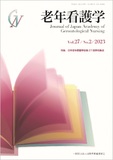Japanese
English
- 販売していません
- Abstract 文献概要
- 参考文献 Reference
抄録
本研究は,内科病棟看護師にせん妄看護に関する教育(講義,事例検討,グループワークおよびシミュレーション)を行い,教育の効果を検討することを目的とした.
内科病棟の看護師28人(平均27.1歳:標準偏差5.4)を対象とし,教育前,直後および6か月後にせん妄の知識に関する自己評価得点を測定した.入院患者については,65歳以上のせん妄発症率およびせん妄罹病期間の割合を教育前後で比較した.看護師の自己評価票得点は,教育前よりも教育直後および6か月後の評価は有意に高く,教育直後と6か月後では有意差は認められなかった.また,せん妄の発症率は,教育前3か月間で15.3%(153 人中23 人)であったが,教育後5か月間で8.0%(224人中18人)に減少し,入院期間におけるせん妄罹病期間の割合も平均78.8%から39.9%と有意に減少していた.
本研究におけるせん妄看護に関する教育は,看護師の知識および実践力を向上させ,せん妄の発症およびせん妄の遷延化を防ぐ効果が認められた.
The purpose of this study was to educate nurses in the internal medicine ward about delirium nursing (lectures, case studies, group work and simulations) and to examine the effects of the education.
Twenty-eight nurses in the internal medicine ward (mean age = 27.1 ± 5.4 years) self-assessed their pre-education, post-education, and six-month post-education knowledge of delirium. For inpatients, we compared the incidence of delirium with the duration of delirium in patients aged sixty-five and over. Post-education and six-month post-education nurse knowledge ratings were significantly higher than those before the education, and there was no significant difference between post-education and six-months post-education ratings. In addition, the incidence ratings decreased significantly : 15.3% (23 out of 153 patients) in the three months pre-education and 8.0% (18 out of 224 patients) in the five months post-education, and the ratio of the duration of delirium to the length of hospital stay decreased significantly from 78.8% to 39.9% after education.
Using education on delirium nursing in this study was found to be effective in improving the knowledge and practical skills of nurses and preventing the onset and prolongation of delirium in patients.
Copyright © 2023, Japan Academy of Gerontological Nursing All rights reserved.


